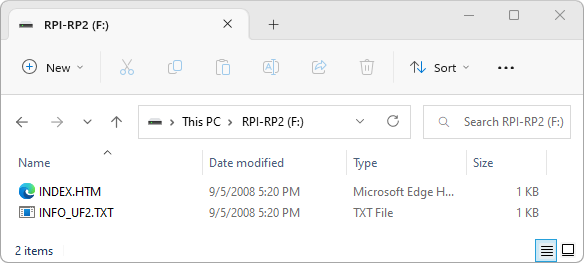Support » Pololu Zumo 2040 User’s Guide » 5. Programming the Zumo with MicroPython »
5.1. Updating the MicroPython firmware
The Zumo 2040 Robot comes preloaded with our custom MicroPython firmware, which you can replace with your own programs or upgrade to a later version of MicroPython.
Checking the installed MicroPython version
Connect the robot to a computer with a USB C cable. If MicroPython is installed on the robot, it should show up as a drive called “MicroPython” that contains Python files:
 |
The dates shown for most of the files and folders will probably correspond to your firmware version, but to check the exact installed version of MicroPython, you will need to connect to the board with a serial terminal program. Here are some general-purpose terminal programs that work with the robot:
- Google Chrome Labs serial terminal – very simple to get started with, web-based, for Chrome, Chromium, or Edge browsers only.
- Tera Term – Windows only.
- PuTTY – cross platform, available for Debian/Ubuntu with apt-get.
- (The Thonny editor that we describe in Section 5.3 also includes a serial terminal, but it requires a few more steps to get started.)
Connect the robot to a computer with a USB cable, run one of these serial terminal programs, and select the correct serial/COM port. Unless you have other serial devices plugged in, this will usually be the only serial port available, and since it’s a virtual serial port, the detailed settings like baud rate do not matter. Once you are connected, press Ctrl+C to exit the running program and Ctrl+B to display the current firmware version. For example, here is what it looks like in the Google Chrome Labs serial terminal:
 |
Connecting to the Zumo 2040 Robot with a serial terminal. |
|---|
In this example, the Zumo is running build 231113-f852876, which was released on November 13, 2023 and is a custom edition of MicroPython version 1.22.0-preview, built from commit f852876 of our MicroPython build scripts.
Firmware versions
The current release is:
- Build 240117-9512cf9 micropython-pololu-zumo-2040-robot-v1.22.1-240117.uf2 (2MB uf2)
Earlier releases are available on GitHub.
Upgrade instructions
Note: Loading a firmware file will delete all programs and data stored on your robot. Make sure you have anything you are working on backed up before you proceed.
Connect the robot to a computer via a USB C cable. To get the board into bootloader mode, hold down Button B while pressing Reset. (You could also hold down the button while plugging in the cable.) You should see two green lights (VBUS and 3V3) and one or more blue lights indicating power, but nothing else should happen on the Zumo. A drive named RPI-RPI2 should show up on your computer:
 |
There are a couple of files in there you can look at, but this is not a real drive like the MicroPython drive. You can’t store arbitrary data in it. All you can do is drop in a UF2-formatted binary to load that onto the robot’s flash memory.
Download the appropriate firmware file from above, copy it to the drive, and in a few seconds you will have MicroPython installed. The RP2 drive will disconnect and immediately reconnect again, showing our demo programs.






